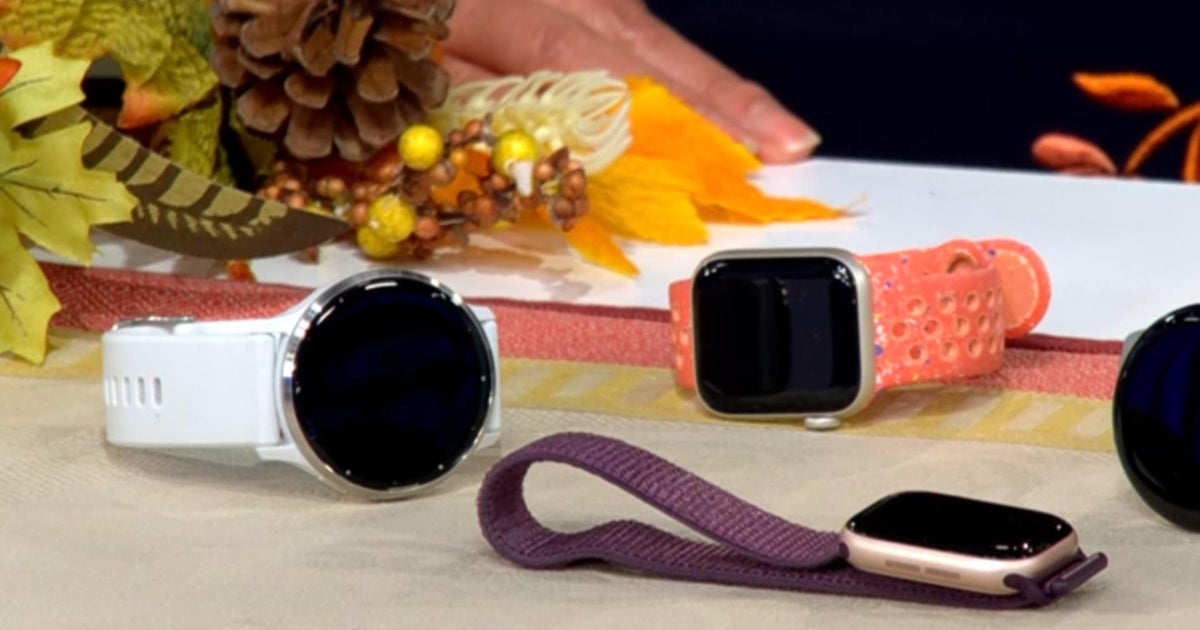CBS News
Don’t just track your steps. Here are 4 health metrics to monitor on your smartwatch, according to doctors.

From smart wearables like the Apple Watch or Garmin trackers to the celebrity-sported Oura ring and trendy WHOOP strap, health tech has come a long way from just tracking your steps.
“There’s lots of different metrics now that we can begin to look at,” says Dr. Davin Lundquist, family physician and chief medical officer at Augmedix. “Anytime that we can have a greater awareness of our health and paying attention to it, it tends to influence behavior in a positive way.”
Here are four that doctors say can be useful to monitor:
Sleep
Most healthy adults can benefit from sleep tracking to some level, says Dr. Carlos M. Nunez, chief medical officer at medical device company ResMed.
“Many users aren’t tracking the right information and can end up fixating or misinterpreting the data rather than observing the larger trends that the trackers can help to indicate,” Nunez says. “Users should start by tracking their sleep-wake cycle to establish a consistent routine of quality sleep, which research has shown can lead to improved concentration, increased productivity and feeling overall more positive.”
Heart rate
Tracking your heart rate can give you a picture into your heart health. The lower your resting heart rate, within reason, the healthier your heart is, explains Lundquist.
“If you’re doing more aerobic exercise, over time, your resting heart rate should decline. And that would be an indication that your heart is getting healthier,” he says.
Respiratory rate
“Certain devices can also provide insight into potential key health indicators – such as your respiratory rates, activity level and more,” Nunez says. “For some users, the data can also indicate how your body is responding to stress.”
Respiratory rate is a metric that may alert someone to other health issues, too. That’s something Michael Snyder, a Stanford School of Medicine professor who has studied smartwatches, experienced firsthand after coming down with COVID-19. Though he took a COVID test that came back negative, his own research app alerted him to sudden changes in his breathing and heart rates.
“I listened to my COVID test, and I should have listened my smartwatch,” he told CBS News in a 2022 interview.
Cardiac rhythm
Tracking metrics like cardiac rhythm may help alert patients to a bigger problems.
“I had a patient whose Apple Watch told them that they had a run of atrial fibrillation,” Lundquist said. “We got this person into a cardiologist — sure enough, it was confirmed and the patient was adequately treated.”
“Afib (atrial fibrillation) is a big deal,” cardiologist Dr. Tara Narula told “CBS Mornings” in 2018 as Apple rolled out electrocardiogram technology in its smartwatches to help detect the heart issue. “It affects millions of Americans, increases hospitalization rates (and) increases death and heart failure.”
It also increases risk for potentially debilitating strokes by five times, she added.
“The problem with afib is that it can be asymptomatic, so you can be walking around and not know you have it while you’re at increased risk of stroke,” she explained, noting that a tracking device could help empower patients, but could also lead to false alarm: “Anxiety, false positives, flooding doctors’ offices with calls. There are definitely downsides, but I think this has the potential to really be very helpful down the road,”
How accurate is the data?
Health trackers have come a long way, doctors says, but you shouldn’t rely on these devices for 100% accuracy or diagnosis. The FDA has specifically warned against any device that claims to measure blood sugar without needles, since inaccuracies could lead to serious health consequences.
For other types of tracking, “The accuracy of some of the smartwatches is still a little bit in question, although with each generation they’re getting better. So I think overall, physicians are getting more confident in trusting these devices,” Lundquist says. Plus, as he points out, users also have to take off the device to charge, meaning data won’t be recorded 24/7.
While trackers can be a “valuable tool for many,” Nunez says the data shouldn’t be used to diagnose serious sleep or health issues.
“Ultimately, sleep tracking devices can help to empower users to set and achieve health goals but are not a substitute for formal diagnosis or professional medical care,” he says.
They can also help physicians partner with their patients, Lundquist says.
“As these applications become more mainstream, the ability to show up in your with your doctor’s appointment, pull up your phone and show them your metrics would be a great way for us to partner with our patients and help them see where there’s potential opportunities or problems,” he says.
CBS News
Houston father desperate for help after wife recovering from C-section, kids deported to Mexico

Watch CBS News
Be the first to know
Get browser notifications for breaking news, live events, and exclusive reporting.
CBS News
Are gold ETFs a good investment now that the price is dropping?

Getty Images
Gold has long served as a safe-haven asset for investors during times of economic uncertainty and market volatility, which is a large part of why it has been so popular over the past year. Thanks to that uptick in gold interest, the price of gold has been climbing throughout much of 2024 — hitting multiple record highs and surpassing $2,700 per ounce at one point late in the year. That price trend has been shifting lately, though, and over the last few weeks, there have been significant fluctuations in gold prices, with the price of gold dropping over the last few days in particular.
With gold’s price currently sitting at under $2,650 per ounce, today’s lower price is prompting many investors to reassess their positions in gold-related investments — including gold exchange-traded funds (ETFs). These investment vehicles, which track the price of gold without requiring physical ownership of the precious metal, have become increasingly popular among retail and institutional investors alike. Much of the appeal of gold ETFs lies in their simplicity and accessibility. Unlike physical gold, these funds can be easily bought and sold through standard brokerage accounts, offering investors a convenient way to gain exposure to gold price movements.
But while the current price dip could present a good opportunity to buy into gold at a discount, it makes sense to remain cautious about any type of investment right now. So is investing in gold ETFs still a good strategy now that the price of gold is slipping?
Find out how to add gold to your portfolio today.
Are gold ETFs a good investment now that the price is dropping?
When gold prices drop, it can create opportunities for investors to buy at a lower cost, potentially increasing their returns if prices rebound. Gold ETFs provide an easy way to capitalize on this strategy. Unlike physical gold, ETFs can be traded on stock exchanges just like equities, offering liquidity and convenience. They also eliminate the need for storage and security concerns associated with owning physical gold.
There are also a few other reasons to consider investing in gold ETFs despite the current price drops. For starters, gold ETFs offer an efficient way to implement dollar-cost averaging during price dips. By regularly investing fixed amounts, investors can potentially lower their average purchase price over time. This strategy can be particularly effective during periods of price volatility, allowing investors to accumulate positions at various price points.
And while gold prices may be dipping now, it’s unlikely that today’s lower prices will remain the status quo over the longer term. Gold prices have historically rebounded and grown over longer time horizons, so while the current price may be lower than it was a few weeks ago, it could represent a good entry point for long-term investors. That’s particularly true if the fundamental factors supporting gold prices remain intact, such as inflation concerns, currency devaluation risks and global economic uncertainties.
However, investors should consider that there are risks to investing in gold ETFs. One issue is that gold ETFs are subject to market volatility and may not provide immediate returns — so it’s important to make any investing decision based on your unique investment goals and strategy. Gold also generates no income or dividends, making it a pure price appreciation play. The opportunity cost of holding gold ETFs also becomes more significant in high-rate environments where yield-generating investments become more attractive.
Diversify your investments by adding gold to your portfolio now.
Who should invest in gold ETFs now?
While investing in gold ETFs may not make sense for all investors right now, it could be particularly suitable for certain types. For example, investors who need to diversify their portfolios may find gold ETFs attractive, as gold has historically shown a low correlation with traditional asset classes like stocks and bonds. So, the current price drop could present an opportunity to achieve portfolio diversification at more favorable prices.
Risk-conscious investors who are looking to hedge against inflation, currency risks or geopolitical uncertainties might also want to consider adding gold ETF exposure. After all, with the uptick in inflation over the last few months, gold’s historical role as a store of value remains relevant right now, despite the potential for short-term price volatility. Long-term investors might also find current prices attractive in terms of building strategic positions.
However, short-term traders and income-focused investors may want to exercise caution when it comes to gold ETFs. Gold’s price volatility can make short-term trading challenging, while the lack of yield may not align with income-oriented investment objectives.
The bottom line
The current drop in gold prices presents an intriguing opportunity for investors who are interested in gold ETFs, but it’s essential to weigh the potential risks and rewards of this type of gold investing carefully. Gold ETFs offer a convenient and liquid way to gain exposure to gold, making them a viable option for many investors, but they are just one of several ways to invest in this precious metal. Whether or not gold ETFs are the right choice for you will ultimately depend on your investment objectives, risk tolerance and overall portfolio strategy, so before you buy in, do your homework to make sure your decision aligns with your long-term goals.
CBS News
NASA again delays return of Boeing Starliner crew

Watch CBS News
Be the first to know
Get browser notifications for breaking news, live events, and exclusive reporting.









